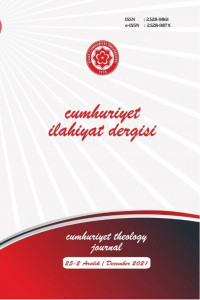Toplumsal İlişkilerin Kurumsallaşmasının İslam Ekonomisi Açısından Analizi
An Analysis of Institutionalization of Societal Relationships from the Perspective of Islamic Economics
Author(s): Harun ŞencalSubject(s): Economy, Theology and Religion, Islam studies, Sharia Law
Published by: Cumhuriyet Üniversitesi İlahyat Fakültesi
Keywords: Sociology of Religion; Islamic Law; Islamic Economics; Commodification; Zakāt; Embeddedness;
Summary/Abstract: The focus of this study is to explore the impact of transformation from living as a community and perceiving cooperation as a responsibility to meet each other’s needs to individualized society of the modern life due to the capitalist market system on religious obligations with economic implications through emerging institution in the modern period. This study will first analyze how the proxy-embeddedness has led to a transformation in the society from the perspective of Islamic economics under four categories: (1) the weakening of Muslims’ relations with their relatives and neighbours; (2) Equalization of worship for different purposes on a common denominator; (3) Lack of social awareness due to deprivation of the experience of performing worship personally; and (4) the prioritization of those capable of being productive over unproductive people in terms of being beneficiaries of zakat or other types of benefits. Worships such as zakāt and sacrifice are among the acts of worshipping that enable wealthy Muslims to help those in need financially. Although the transfer of material resources to the needy people through modern institutions ensures the fulfilment of worship, through which principles and objectives this transfer is carried out are also important. Significant transformations are observed in the way these worships are performed compared to the pre-modern period, as institutions that carry out zakāt and sacrificial meat collection and distribution activities in line with capitalist principles such as low transaction costs and efficiency. First, it is expected from a Muslim to be aware of the social environment he/she is in, be aware of the needy, and maintain social relations within this awareness. All kinds of charity and financial aid at the level of individual relations, especially zakāt and sacrifice, ensure the continuation of this awareness. If Muslims perform these worships and charity activities through institutions, the awareness of one’s environment will weaken. A second transformation is to make these worships indistinguishable from each other by equating them to the common denominator of paying money. This situation leads to the equalization of worship at the material level and causes the differences to be invisible for Muslims who perform the worship. A third transformation is that the realization of worship by institutions through the proxy system causes Muslims to be deprived of the experience of performing worship individually. While these prayers are performed through institutions in an efficient and low-cost way, the only thing expected from Muslims is to make the necessary payment through the bank. In this case, the spiritual contributions expected to be realized during the fulfilment of the worship decrease. Finally, we see that some institutions utilize capitalist principles and goals to decide who should receive financial aid. For this reason, people who can become a productive factor due to the help they receive are prioritized over others. There is a rational choice behind this decision mechanism: It is aimed to reduce the number of needy people in society by transforming zakat recipients into zakāt payers. On the other hand, Islamic sources do not consider such a priority among those who deserve to receive zakāt. Moreover, this situation will lead to the permanent postponement of people who are not included as a productive factor in the capitalist system but in need. In the second part of the study, an analysis of the agency (vekalet) system, which allows individuals to transfer some of their responsibilities to private institutions to spend time more efficiently, is conducted through the example of nursing houses. Another example of the fulfilment of zakat and sacrifice through the proxies given to institutions is that Muslims fulfil their responsibilities towards their relatives through institutions such as nursing houses. The reason for such a need arises from the fact that people, who take place as human capital in the capitalist system, are required to spend their time to improve themselves, get new education and gain more experience, instead of spending their time taking care of their relatives so that the production process can continue to grow. Although this type of service contract is formally valid in terms of Islamic law when evaluated in terms of the bond that Islamic morality envisages to be established between Muslims and their relatives and the protection of this bond, institutions such as nursing houses can lead to the commodification of family ties due to the transfer of responsibilities to relatives in return for a service fee.
Journal: Cumhuriyet İlahiyat Dergisi
- Issue Year: 25/2021
- Issue No: 2
- Page Range: 661-677
- Page Count: 17
- Language: Turkish

